Angel Hotel, Melville Centre & Theatre, St Michael’s Centre, and Market Hall, Abergavenny, 1-4 September 2016
To begin at the beginning. Singer Lee Gibson, who with the Dave Cottle Trio performed at the introductory festival dinner, offered the familiar and the rare in songs made even more famous by Ella Fitzgerald, Sarah Vaughan and others, including Mike King. Who Mike King? He was on one of Gibson’s teaching courses and tentatively offered her a song he’d written called ‘That’s When I Miss You the Most’, which she’s added to her catalogue because, as she rightly identified, it was jazz singer material. Gibson knows what’s what in her game, even down to spicing her programme with stories, including the one, probably apocryphal, about the anonymous letter addressed to ‘the world’s greatest jazz drummer’ in the USA and beginning – once it had been opened by the immodest Buddy Rich – “Dear Ringo”. Also, she was astute when it came to sussing the make-up of her audience, at one point asking the serious jazz fans to hold up their hands. There weren’t many, but that was OK: at least, the 150 or so diners ram-packing the Angel Hotel’s ballroom recognised the festival as important, even if pledging only timorous support for the kind of music it betokened next day at the Melville Centre and Theatre, new home for a year of festival organiser Black Mountain Jazz. Gibson’s well-honed contributions couldn’t have but helped sway the uncertain towards at least a speculative visit. It’s the way jazz audiences are grown: slowly and with long-baked stoicism.
Someone who kept their hand down asked me why Gibson and the band sounded so loud in what was a reasonably intimate space. It was a good question, to do with the need to plug everyone into the mains when electric bass and piano are being played instead of their acoustic versions. That even a fully-wired combo can be made to sound normal seemed a justifiable statement to make to a non-jazzlover with at least the perception to hear what the experts, and by extension the musicians, clearly cannot. But technical debate was off the menu, postponed for another time.
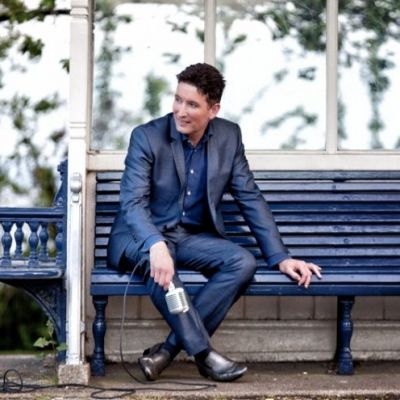
The sound was just right at the opening gig by singer Kevin Fitzsimmons next day at the Melville. Jazz FM described the personable stylist’s voice as a mixture of Sinatra, Bennett and Bublé. This makes him sound eclectic. He tells a joke against himself about Bublé, saying that he’s decided to call himself that because it ‘opens doors’. But Kevin Fitzsimmons sounds like Kevin Fitzsimmons. He has a rich and strapping voice, instantly recognisable, and unlike a lot of singers he’s embedded himself in the perfect band environment, where he’s complemented as a swing merchant by pianist Leon Greening (here on keyboards), drummer Matt Fishwick and, depping for the Abergavenny appearance, no less than Alec Dankworth on bass. The group concentrated on jazz singing in the 1960s, ending with a version of Lennon-McCartney’s ‘Norwegian Wood’ as a belated and tacit admission that in many ways jazz was drowned out by pop in that decade.
Mel Tormé is a strong influence, ‘Sunday In New York’ and ‘All That Jazz’ being associated with him and here divorced from any thought of slavish imitation. The voice is different, anyway. Drawing on music for films, the group – it’s hard not to think of Fitzsimmons and Co. as a group – took on the Quincy Jones/Don Black song, ‘On Days Like These’, from The Italian Job, and one of a few ballads, ‘I’ve Grown Accustomed To Her Face’, from My Fair Lady. Male jazz singing of this sort has settled into a few formulaic licks which makes it difficult to pin down originality. But the way Fitzsimmons flies freely around his themes, sometimes making you wonder whether he’s travelled too far, is exciting to hear, an aerial performance. He always arrives home in one piece. And he has a few tricks of his own, one a kind of alliterative stutter, employed sparingly.
Welsh pianist Huw Warren is an international figure and in Welsh terms a treasure. He played a big part in formulating compelling programmes at Brecon Jazz. On this occasion, he brought his love of South American music to the festival, hitting the ground on full throttle with his Brasil Trio (himself on keyboards, bassist Dudley Phillips and drummer Zoot Warren), fronted by the formidable saxophonist and former Loose Tubes member, Iain Ballamy. Brazilian rhythms and colour permeated everything, even ‘Flamingo’, once it was prised from its Eastern European origins (it was written by Romanian, Ted Grouya) and its tame popularity (it’s the melody always associated with Earl Bostic). Jelly Roll Morton once said that if music didn’t have a Spanish tinge it wasn’t jazz. Warren’s group certainly sounded as though it could survive if obliged to play only the music of the Brazilian Hermeto Pascoal, whose ‘O Farol Que Nos Guia’ set a romantic tone.
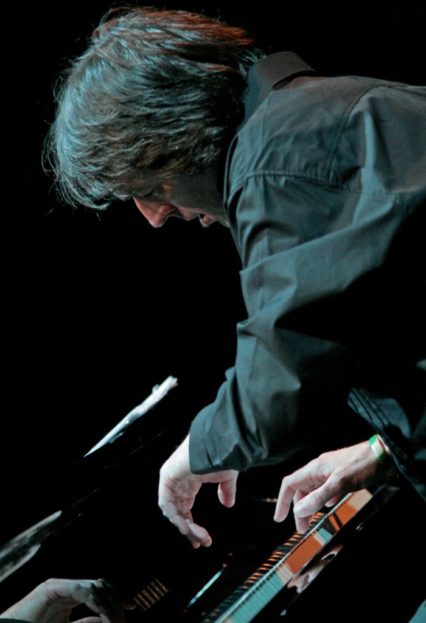
Warren is a compulsive and hugely watchable pianist – ‘unstoppable’ also comes to mind. The impression is of someone who not only focuses unblinkingly on one sort of music but comes at everything with his wider interests – classical, contemporary, folk, etc – always on the edge of his vision and likely to be drafted in should occasion demand. The pejorative term for that is, again, eclectic, but in Warren’s case the whole never threatens to be less than or the same as or more than the sum of its parts. The result is not pure Brazilian but contemporary jazz with its ensemble/solo conventions infused by a South American beat of samba, frevo, choro and others in the Mortonesque sense. Fitzsimmons in his gig accelerated the Tony Jobim tune ‘Desafinado’ to suit the generally upbeat mood of his group but when Warren went lyrical, in Pascoal’s ‘Desencontro Certo’, it was in duet with Ballamy and the result was an intertwining of sultry, florid lines.
Although Warren has probably performed all this music in every combination, the Ballamy tie-up worked a treat and the band sounded like a permanent fixture, with Zoot Warren’s drumming the essential though unobtrusive presence and Phillips’s six-string bass never denied its wider range and tendency to pop up at the party, particularly in a thoughtful solo spot using foot-operated gubbins. It was not only convenient but altogether fitting that Warren, Ballamy and Phillips should have appeared at Wall2Wall: they all teach in Paula Gardiner’s jazz studies department at the Royal Welsh College of Music and Drama, Cardiff, where saxophonist Olly Jenkins, who did one of the a head-turning interval stints in the bar with keyboard player Coren Sithers, is about to join the studentry.
First up on the third and busiest day was the TMC Gospel Choir: T for Torfaen and MC for music centre, an outpost of the once-embattled Gwent Music, the peripatetic schools tutoring service looked upon a few years ago and semi-officially – but never grudgingly by its UK counterparts – as the best in Britain. That was just before its public funding went rear-over-elbow. The cuts were a disgrace but, musicians being musicians, the service struggled on. The choir was founded by the inspirational Susie Webb, aka Bluesy Susie, who nurtured it until it was big enough and good enough to appear in a schools festival at the Royal Albert Hall in 2014. For Wall2Wall, bouncy Alex Davis led a smaller version of it from the keyboard in a performance at which the jazz input was amusingly reflected in its wing-and-a-prayer nature, a ‘will it or won’t it work?’ feel that was engaging and edgy – and it did work. This is perhaps a way of bringing kids to jazz, with a bit of gospel (but not much), plenty of material with swing-and-shout elements from show songs and pop, and bundles of freedom. For example, the five lads in the choir joined their director in a lively version of Billy Joel’s ‘Uptown Girl’. All the soloists, male and female, were keen to step forward. Susie Webb, now furthering her career elsewhere, would have been proud.
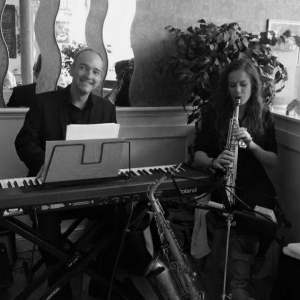
Cardiff pianist Gareth Hall and the likeable and home-grown saxophonist Martha Skilton found themselves without singer Naomi Rae for their ‘Reflecting the Forties’ gig, so local songstress Debs Hancock did an Alec Dankworth and stepped in at short notice. Having sung with Hall before, her slinky, shadowy tones were applied, sans jitters, to ‘Ain’t Misbehavin’, ‘Fly Me To The Moon’ and others, with Skilton adding lustre as and when. A singer with a catalogue on tap at the last minute – praise the lord! Skilton and Hall worked their way with duo expertise through Forties or Forties-related material, Skilton, variously on soprano, alto and tenor, displaying acute judgement in allowing us to hear the tunes – ‘Skylark’, ‘Take the A Train’, ‘Satin Doll’, ‘Time After Time’ – without overdoing the embroidery, and Hall moving effortlessly from comping to leading. There was instruction too, the sardonic Hall reminding us that some band solos of the time weren’t as improvised as they sounded; he played a Bill Kinghorn arrangement of Matt Dennis’s ‘Everything Happens to Me’ as extrapolated illustration – a piece notated to appear as though the pianist were making it up. At least, I assume that was the idea. Bill Evans will never be the same again. He’s a hoot is Gareth.
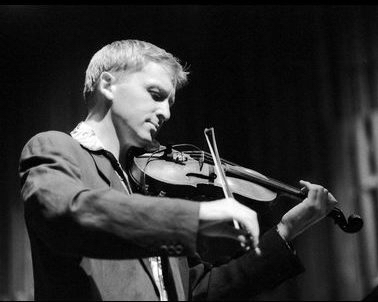
Violinist Chris Garrick opened quirkily with a piece by William Walton – Touch Her Soft Lips And Part – in his set with pianist David Gordon, as if to provoke the question of what it was doing at a jazz festival. What it was doing was being addressed in a free-ish jazz manner typical of the way Garrick turns the violin, with its modifying pick-up, into a penetrating (and competitive) instrument, with its own way of attacking the material, much as Earl Hines ‘trumpetised’ the piano. Having set himself up – though Gordon, a well-known harpsichordist, was no adversary – he very much led the way, even attracting attention with extended pizzicati when the focus was on the keyboard, and frequently ending a phrase with a sabre-like slash. Not that Garrick is backward in coming forwards when the fiddler’s customary techniques are required. It’s just that you cannot play a bebop tune such as Bud Powell’s ‘Celia’ without giving it an acidic bite, or Ellington’s ‘In A Sentimental Mood’ and not subvert the sentimentality with the hint of a musical smirk. For sure, it’s not the way Stephanie Grappelli played it. The pair ranged widely, from C.P.E Bach to Stevie Wonder and John Taylor’s ‘Coffee Time’, a piece from the late and lamented Taylor’s days with Azimuth. Garrick even played a blues on his five-string violin, intended to give the instrument a viola-like depth, not that the viola is commonly heard in jazz avenue. Chick Corea’s ‘Spain’, which opens with a snatch from Rodrigo’s Concierto de Aranjuez, seemed to embody the idea that the pair could give anything the jazz treatment. Was there a route this telepathic duo would not take? If Gordon had switched to harpsichord mode, Garrick would have jazzed it.
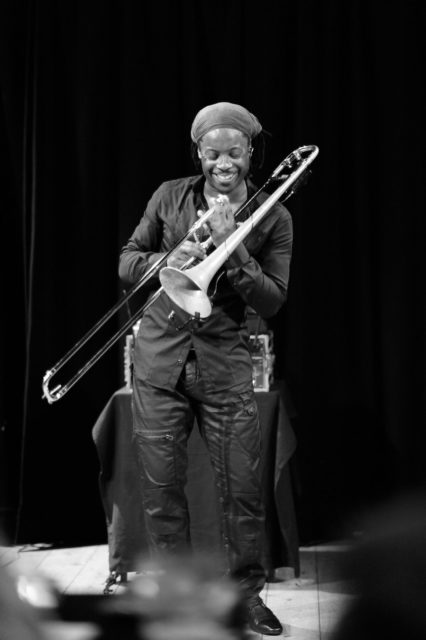
As for the festival’s serial breach-filling, Liam Dunachie followed Dankworth and Hancock in replacing a musician unavailable at the eleventh hour, in this case organist Ross Stanley in the Dennis Rollins Velocity Trio; and without its showing, to judge by the funky trombonist-leader’s expressions of gratitude and admiration. Any ‘dep’ at this desk cannot afford to be shrinking violet. Responsible for the trio’s harmonic superstructure as well as its bass lines, he has to fly with Rollins’s capacious lead and Pedro Segundo‘s upfront drumming. Drumming? Segundo turns a kit into a percussion department, with cow bells, rainsticks, shakers, tin sheets, and a tendency to hit, scratch and scrape everything in sight, including with his bare hands. It’s diverting but never a sideshow: there’s no time in this band for counter-attractions.
Often harmonising and modifying the trombone’s sound with electrical paraphernalia, Rollins sees the trio as a company of equals, on this occasion mainly drawing on extant recordings, including from the 11th Gate album the title track, ‘Emergence’, Eddie Harris’s ‘Freedom Jazz Dance’, and ‘The Other Side’. The last number is a haunting journey into the unknown and it moved the audience to respectful silence – some feat for a trombonist. Everywhere else the trio kept on the go, though there was another paragraph of reflection in Amanda McBroom’s ‘The Rose’. The riffing title track from the trio’s latest album, Symbiosis, included Dunachie emulating Ross Stanley in a fiery and ever-expanding feature. The gig made you want to dance, shout and reflect in various permutations, and for Rollins it was another opportunity to show how much he has to give as primus inter pares. He also led one of the festival’s four workshops, dealing with acoustic and electronic instruments.
On the night TV’s Strictly Come Dancing paired its celebrity clodhoppers with their professionals, the festival proper ended with the Tango Jazz Quartet, from Argentina. A foursome that demonstrates how tango and its variants support a musical culture more than they offer just an excuse to take the floor with risqué intent, the TJQ tour the world like missionaries. The South American dimension results in essentially fusion music, as Huw Warren showed the previous day, though this quartet, led by Gustavo Firmenich on throaty tenor sax and snappy clarinet, never allows its members to take off on their own. The mild exception to this formula is keyboard player Horacio Acosta, a fine, two-handed performer who would have been better served by acoustic piano (the issue of acquiring one for club and festival might be usefully considered); or at least it would have been interesting to hear him playing it. Firmenich apologised for his English pronunciation. The announcements only mattered in terms of tango niceties, though Piazzola’s Libertango seemed to be in there somewhere, and throughout the gig the music as an experience inclined the audience more to dancing than listening in a way that didn’t apply to Warren’s set. Certainly the tight charts circumscribed the jazz territory, with drummer Alejandro Beelmann and bassist Frederico Hilal more attuned to strict tempo than any timekeeping the goings-on might have suggested, but which had to be off limits. The tourists should have been exhausted but they weren’t. Keeping up with their tango torrent made the audience exhausted – pleasantly.
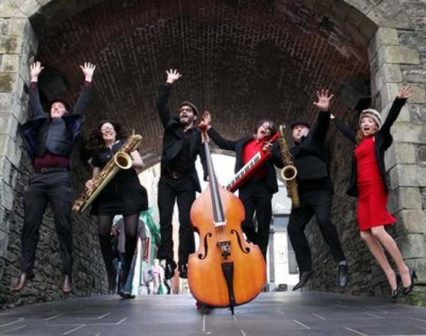
The Melville bar’s proximity to the theatre under the same roof made it possible to corral the ‘fringe’ events of previous years. The other interval acts involved Coren Sithers and Tom Morley, Stainless Steve Garrett and Christine Heath, harpist Ben Creighton Griffiths and, popping up again, Debs Hancock with Julian Martin. Lee Gibson also led a workshop at St Michael’s, where there was a parent-toddler music session and a ‘samba challenge’ for groovy tyros. On Sunday, it was free entry at the Market Hall’s ‘Jazz Alley’ to hear the KoGo Project’s jazz-funk and the world music of Baraka. The Red Stripe Band hosted a Boogie Party in the evening, at which ticket-holders floored by excellence at the Melville were raised Lazarus-like by boogie, swing and rock ‘n’ roll classics to join many others for what Black Mountain’s Mike Skilton described as ‘probably the highlight of all four festivals to date’. It was a breathtaking weekend catering for all tastes. That’s how it goes these days. But jazz will always be central, even though its borders allow an increasing amount of free movement.
Header photo of Iain Ballamy by Dave McKean


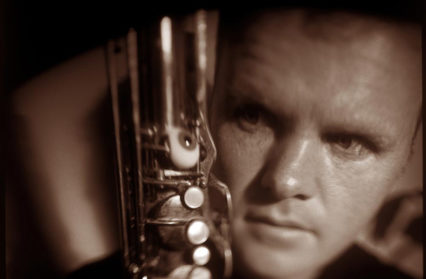
 Enjoyed this article? Support our writers directly by buying them a coffee and clicking this link.
Enjoyed this article? Support our writers directly by buying them a coffee and clicking this link.







